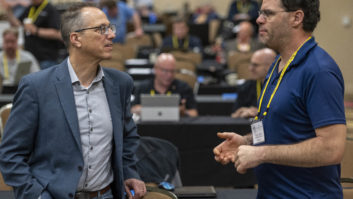For most professionals, the idea of emotions in the workplace is viewed as a disrupting influence on the ability to get work done efficiently.
We have all observed angry voices, fist pounding, abrasive augments, passionate rigidity and even sexual flirtations. I have never heard anyone argue that these manifestations of emotions should be tolerated in the workplace. One executive once told me that emotions and psychology should be left at home.
Engineers are especially hostile to the idea that emotions have utility in the workplace, believing instead that this profession must be based on logic, reason, inference, deduction and the hard cold facts of observable reality.

iStockphoto/Mark Stay In the 1960s, the science fiction television series “Star Trek” introduced us to the character Mr. Spock, who was half human and half Vulcan. He continued in the more recent feature movies as the prototype of a typical engineer. The character embodies the essence of logic, literalness and reasoning, thereby becoming the most famous symbol of what I call “anti-emotionalism.” As if to highlight the weakness of human emotions, Mr. Spock said: “Nowhere am I so desperately needed as among a shipload of illogical humans.”
Could this view of emotions be totally wrong? I will attempt to demonstrate that life as we know it stops if emotions are removed. Fortunately, people cannot suppress emotions.
NO EMOTION, NO FUNCTION
To begin, we need to look at what neuroscience research tells us about emotional substrates in the brain.
Emotions have been said to exist as part of the limbic system, which includes the amygdala and other connected substrates. Occasionally, a patient shows up for medical treatment with those parts of the brain having been damaged by accident or disease. These cases illustrate what happens to a person without emotions. On the one hand, they appear normal but when examined more carefully, the consequences of the injury become clear.
Such people have difficulty driving a car, but not because they lack the cognitive and motor skills to control the vehicle; rather they simply do not care if the car is heading towards a child playing in the middle of the road.
In one case a scientist reported that it took him more than four hours to get dressed in the morning. He could see all of his choices in the closet but he had no means to make a decision. Should he wear a blue sock on his right foot and a red sock on his left foot? He simply did not care because all of the choices were equivalent without emotions. Every possible combination of clothing could be considered as a choice. This is the real Mr. Spock: non-functioning.
How then can we reconcile the common view of emotions as being negative with the medical reality that we cannot do even the simplest task without them?
Consider first that the word “emotional” is reserved for those cases where the emotions are inappropriately intense and correspondingly destructive, like an adult tantrum. I call such extremes emotional hijacking; too much of a good thing becomes destructive.
Because emotions are like water to a fish — all around us — we lack a vocabulary for the emotional water that we swim in. Ordinary emotions are simply the answer to the question: “Why do you care?”
PERSONAL CURRENCY
Let us consider an engineering meeting discussing a particular technical problem that needs to be addressed. Everyone has an opinion, and each of these opinions is an individual’s unique answer to the previous question. “I care because….” Publically, everyone may state that we all care because it is good for the broadcast station to have the issue addressed. However, each individual has a private reason for caring.
Here are some possible reasons why an individual might care. He wants to prove to his father that he made the right career choice. He wants to show he is intelligent because he is trying to raise his self-respect. He wants recognition to get a raise so that he can send his daughter to college. He wants the younger engineers to see him as still having value. He wants his choice to dominate the discussion as retribution for a previous insult. He is trying to compensate for an inferiority complex because he never went to college. He views life as a competitive sport with winners and losers. He wants to impress the cute new female engineer so that he can ask her out on a date.
These answers can dominate each individual consciously or unconsciously. I call the answers a person’s personal currency. We get paid in emotional currency in addition to our regular paycheck. Management studies have consistently shown that financial compensation is rather low on the criterion for job satisfaction even though many of us think that is the largest motivator. It is not. Our personal currency is the driving force because it answers the question about why we care about something.
This discussion is not intended to be academic. There are meaningful implications to your engineering department. If you want to make a group of engineers function as a well-oiled machine with strong interpersonal cohesion, everyone in the group must be paid in their personal currency. And that requires everyone to understand everyone else’s currency. A friendly chat over a cup of coffee is the easiest way to share currencies. Not only will a group that pays each other in personal currencies be more efficient and productive, but everyone will also enjoy their work. Group cohesion is a win-win.
WHY DO YOU CARE?
As an exercise, ask yourself why you have bothered to read this article? You could have stopped at the first paragraph. Why do you care about what I am saying? What is your currency? How do my ideas provide you a payment in your currency?
I can use myself as a teaching example. Why have I bothered to write this article? Yes, I am paid to write but the amount of money that I receive is embarrassingly small and by itself that amount would not motivate me to spend hours on each article. Another possible answer is that I enjoy the stature and fame that public exposure brings. While such rewards are real, they are not my driving motivation. The core reason is that I want to have a positive influence on my friends, family and colleagues, leaving some kind of legacy before my 67-year-old body eventually gives out. My personal currency is nurturing. It wasn’t always so, but it is now.
I also have a long-term secondary currency: creating new fields and markets, such as digital audio in the 1970s, character recognition in the 1980s and aural architecture in 1990s. Recently, I have been developing new methods to teach soft-skills to executives, engineers, therapists, immigrants and young students. This new activity could be motivated by my desire to earn more money. I provide most of these services pro bono, free to those who cannot pay. My primary and secondary currencies are actually merged: creating a new field that directly and indirectly provides nurturing to others. I get paid in two currencies at the same time. While I might eventually make real money teaching soft-skills, that is not my motivation.
THE PAYOFF
The same model of currencies works in all kinds of social interchanges. Consider coming home and having a fight with your teenager about staying out late at a party. You need to figure out the kid’s currency, which might be nothing more than having a cool image. Together, you might be able to invent a better way of paying the kid in a safer form of the same currency. Everybody wins.
The difficulty is that you cannot discover a person’s currency by simply asking him what he wants. You are likely to get a socially acceptable answer but not one that is real. Instead, while at lunch, ask a colleague what aspect of their job or hobby he really enjoys. What makes life fun? The answer will reference their currency. Now the payoff: during an engineering meeting, indentify a useful task that has elements of this currency and publicly recommend that this colleague be encouraged to do that task. You are likely to get enthusiastic support and appreciation. This is leadership! People will follow those who pay them in their currency. I have used this method for more than 40 years, and trust me, it really works like magic.
Barry Blesser is director of engineering for 25-Seven Systems. Opinions are his own. Comment on this or any article to[email protected].












